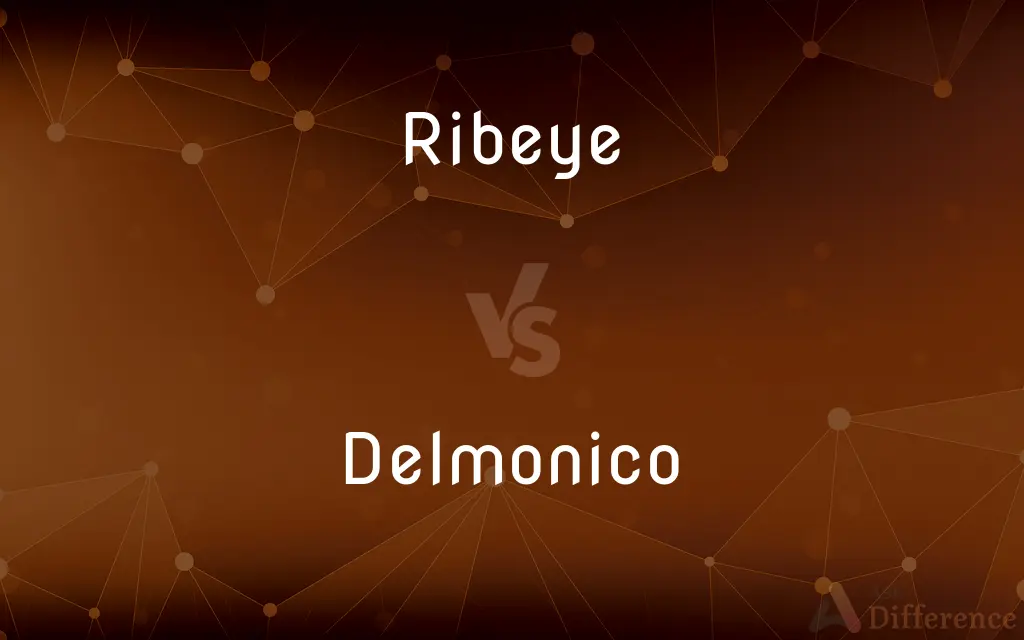Ribeye vs. Delmonico — What's the Difference?
By Tayyaba Rehman — Published on December 15, 2023
Ribeye is a beef cut from the rib section, known for marbling and tenderness. Delmonico, a term with varied definitions, often refers to a style of preparation or a restaurant's special cut, potentially a ribeye.

Difference Between Ribeye and Delmonico
Table of Contents
ADVERTISEMENT
Key Differences
The Ribeye is a prized cut of beef taken from the rib section, celebrated for its rich marbling and flavorful taste, making it a favorite among steak enthusiasts. On the other hand, Delmonico is a term that historically refers to various cuts and preparations of steak, depending on the region and the restaurant, sometimes relating to a ribeye.
Ribeye steaks, recognized for their marbling, are cut from the top of the rib primal portion of the cow, just behind the shoulder. Whereas, Delmonico's ambiguity arises from its historical context; the name originated from the Delmonico Restaurant in New York City in the 1800s, but has since referred to different cuts and preparations, causing confusion and inconsistency in its meaning.
While a Ribeye is specifically known for its fat marbling which gives it robust flavor and tenderness, the Delmonico cut's characteristics can vary. Although sometimes a ribeye, a Delmonico might also be a different cut altogether, seasoned or cooked in a way specific to the chef's or restaurant’s preference.
Ribeye, due to its consistent identity, is easily recognized in butcher shops and menus, its features celebrated and unmistakable. Delmonico, however, has a flexible identity; one restaurant’s Delmonico might be a ribeye, while another’s could be a completely different cut, leading to a culinary adventure or unpredictability, depending on one’s perspective.
In essence, while Ribeye enjoys a universal recognition and appreciation among meat connoisseurs, Delmonico remains a wildcard – its definition steeped in historical prestige, regional preferences, and culinary innovation, with the potential to be a ribeye but not a certainty.
ADVERTISEMENT
Comparison Chart
Definition
Specific cut of beef
Varies; cut/preparation/restaurant special
Origin
Rib section of beef
Delmonico Restaurant, 19th-century NYC
Characteristics
Marbling, flavor, tenderness
Inconsistent; region/restaurant-dependent
Recognition
Universally known and standardized
Ambiguous, varying definitions
Culinary Usage
Consistent in dishes worldwide
Subject to chef/restaurant interpretation
Compare with Definitions
Ribeye
Ribeyes are known for their rich marbling and tender texture.
She savored the Ribeye, appreciating every juicy, tender bite.
Delmonico
Delmonico refers to a style of preparation or specific cut of steak, historically originating from the Delmonico Restaurant.
The menu featured a Delmonico steak, the restaurant's prized specialty.
Ribeye
Ribeye is a cut of beef harvested from the rib section.
The chef recommended a grilled Ribeye for its flavorful marbling.
Delmonico
Delmonico's definition varies regionally and by restaurant, often causing confusion.
What is considered a Delmonico here is different from what I had in New York.
Ribeye
A Ribeye steak is often considered one of the highest-quality cuts of beef.
At the upscale restaurant, he ordered a Ribeye, expecting nothing but the best.
Delmonico
Delmonico steaks, regardless of the exact cut, are typically well-marbled and flavorful.
Despite the ambiguity, her Delmonico was delicious, tender, and richly marbled.
Ribeye
Ribeye can be bone-in or boneless, affecting flavor and cooking methods.
For the barbecue, they chose a bone-in Ribeye for its enhanced flavor.
Delmonico
Delmonico can sometimes refer to a high-quality ribeye, but not always.
Tonight's special is a Delmonico steak, grilled to perfection with our house rub.
Ribeye
Ribeyes are distinguished by their fat content which contributes to their flavor.
The succulent taste of the Ribeye was all thanks to its perfect fat distribution.
Delmonico
Delmonico is known for its ambiguity, leading to a sense of culinary adventure.
He ordered the Delmonico, curious to see the chef's interpretation of the classic.
Ribeye
Ellipsis of ribeye steak}}; {{qualifier
Ribeye
Synonym of ribsteak}} {{gloss
Ribeye
A run batted in.
Watson had a 3-run homer and a 2-run double for a total of five ribeyes on the night.
Common Curiosities
What is a Ribeye?
A Ribeye is a steak cut from the rib section of beef, known for its rich marbling and tenderness.
Can a Delmonico be a cut other than a ribeye?
Yes, a Delmonico can refer to various cuts depending on the chef or restaurant.
What is Delmonico?
Delmonico is a term that refers to various steak cuts, originally popularized by Delmonico's restaurant in New York, and it often denotes a boneless ribeye.
What distinguishes a Ribeye in terms of flavor?
A Ribeye is known for its rich, buttery flavor due to high-fat marbling.
Why is Delmonico's definition so varied?
Delmonico's varied meanings result from regional interpretations and its historical context.
What makes the Ribeye distinct from other cuts?
Ribeye is known for its rich marbling, which enhances its flavor and tenderness.
Are both Ribeye and Delmonico suitable for grilling?
Yes, both cuts are prime choices for grilling due to their fat content and tenderness.
Is the flavor profile of Ribeye and Delmonico similar?
If Delmonico is a boneless ribeye, their flavors are very similar. However, the taste can differ if Delmonico refers to another cut.
Which is more tender, Ribeye or Delmonico?
Given that Delmonico often refers to a boneless ribeye, their tenderness is comparable. However, if Delmonico denotes another cut, tenderness might vary.
Can I substitute Delmonico for Ribeye in recipes?
While you often can, it's essential to ensure that the Delmonico cut you have is indeed a ribeye variant to match the flavor and texture expectations.
Is Ribeye the same as Delmonico?
While the term Delmonico can refer to a boneless ribeye, it's not strictly synonymous with Ribeye and can sometimes represent other cuts.
Can I find both Ribeye and Delmonico at a typical butcher shop?
Yes, most butcher shops will carry both cuts, though Delmonico might sometimes be labeled differently based on regional preferences.
Are Ribeye and Delmonico high in fat compared to other steak cuts?
Yes, both are known for their fat content, which contributes to their flavor and juiciness.
Are there bone-in and boneless versions of Ribeye?
Yes, Ribeye can be found both with and without the bone.
How did Delmonico get its name?
The term "Delmonico" was popularized by Delmonico's, a famous restaurant in New York, in the 19th century.
How thick are typical Ribeye and Delmonico steaks?
Both can vary in thickness, but they're typically cut between 1 to 2.5 inches thick.
Which is pricier, Ribeye or Delmonico?
Prices can vary, but Ribeyes are generally pricier due to their popularity and marbling.
Why is marbling important in Ribeye?
Marbling, or fat interspersed within the muscle, enhances the steak's flavor and tenderness when cooked.
Share Your Discovery

Previous Comparison
Debtors vs. Creditors
Next Comparison
Ermines vs. WeaselsAuthor Spotlight
Written by
Tayyaba RehmanTayyaba Rehman is a distinguished writer, currently serving as a primary contributor to askdifference.com. As a researcher in semantics and etymology, Tayyaba's passion for the complexity of languages and their distinctions has found a perfect home on the platform. Tayyaba delves into the intricacies of language, distinguishing between commonly confused words and phrases, thereby providing clarity for readers worldwide.












































